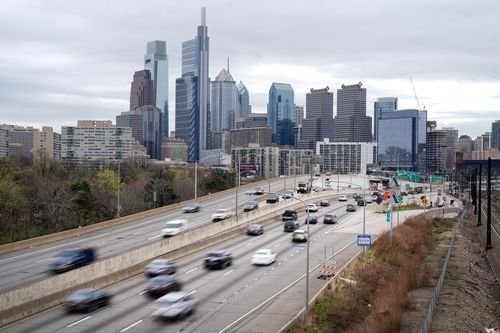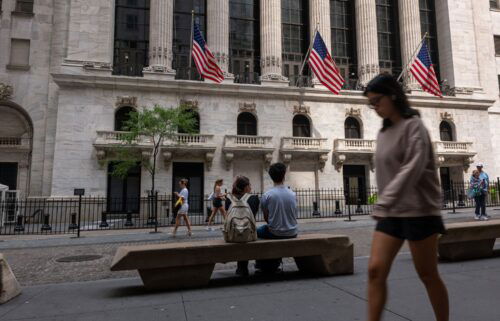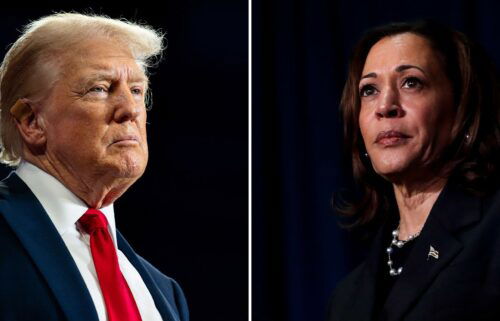Wall Street is betting on Joe Biden getting infrastructure done

Wall Street is once again betting on infrastructure. And after four years of dashed hopes, investors have reason to believe Washington will finally get something done to repair highways, and spend more on telecom networks.
President Biden’s proposed $2 trillion infrastructure plan has the market excited.
The iShares U.S. Infrastructure exchange-traded fund and Global X U.S. Infrastructure Development ETF, which trades under the appropriate ticker symbol of PAVE, are each up more than 15% so far in 2021.
“Investors have been waiting a long time for a generous, federally led infrastructure package,” said David Bianco, chief investment officer of the Americas for DWS. “Politicians have promised this for more than a decade. Something’s finally going to be done and it will be big.”
So it should come as no surprise that the infrastructure ETFs, which own many top industrial firms, are surging this year.
Top holdings in the iShares fund include railroad Kansas City Southern (which is getting bought by Canadian Pacific) and utilities such as Entergy, York Water and Exelon. The PAVE ETF has big stakes in train companies Union Pacific and Norfolk Southern as well as Kansas City Southern, and it’s also is a big investor in industrial equipment giants like Deere and Eaton.
It’s clear that many investors are banking on a big push to rebuild traditional types of infrastructure: transportation networks, aging electric grids and water systems.
“The Biden administration and Congressional Democrats are looking to spend as a means to push the economy forward,” said Jim Baird, chief investment officer with Plante Moran Financial Advisors. “The beneficiaries could be wide reaching across the construction and commodities sectors.”
High tech could win big too
Experts point out the Biden plan could be good news for several industries — even if the final price tag winds up being a little lower than $2 trillion due to cost concerns from Republican lawmakers and fiscally conservative Democrats such as West Virginia senator Joe Manchin.
Manchin said Monday that “as the bill exists today, it needs to be changed.” He cited resistance to the Biden proposal for a hike in the corporate tax rate from 21% to 28%. Manchin suggested he’d be willing to compromise and would agree to a 25% rate.
Donald Calcagni, chief investment officer with Mercer Advisors, told CNN Business that he thinks Biden is “politically astute” enough to know how “the sausage gets made” in Washington, adding that “there will still be some horse trading.”
In other words, the president will probably be amenable to negotiating in order to get a deal done, which is why many investors are still betting that an infrastructure package will eventually be signed into law and are now focusing on companies in the green energy sector that could benefit from it.
“The big winners are going to be electric vehicles, charging stations and clean tech. You have to look at what’s good for the environment,” said Patrick Healey, founder and president at Caliber Financial Partners.
Along those lines, he said companies such as Tesla and rival Lucid Motors, which is in the process of merging with blank check firm Churchill Capital IV, make sense for investors. So do other clean energy companies like ChargePoint, Blink Charging, Bill Gates-backed battery maker QuantumScape and Romeo Power.
Biden’s plan is also likely to give a lift to companies that run cell phone towers, data centers and other high tech and telecom infrastructure, said Mercer’s Calcagni.
Shares of wireless infrastructure companies American Tower and Crown Castle are both up around 10% this year. So is the Defiance 5G Next Gen Connectivity ETF.
“I do like how this plan fundamentally broadens what is defined as infrastructure. If Covid-19 has taught us anything, we need more broadband access,” Calcagni said.
Take the long view
Still, much of this spending will roll out slowly over the next decade.
So investors will need to be patient, especially as President Biden and Congressional leaders try to figure out how big the spending bill will be and how it will be financed. It will likely be paid via a mix of corporate tax hikes and partnerships with private industries and state and local governments.
“This is going to be positive in the long run for tech firms, manufacturing companies and even municipal bond investors,” said Stephen Dover, chief market strategist and head of the Franklin Templeton Investment Institute.
“But this is not a shovel-ready plan. It’s not stimulus in the usual sense,” Dover said.
That isn’t necessarily a problem, however. Some experts are applauding the Biden administration’s apparent willingness to play the long game to ensure the US doesn’t fall behind China, Europe and others in the global economy.
“This isn’t just about repairing what’s wrong now right away, but also managing for the next 30 to 50 years,” said Christophe Petit, co-founder and president with Star America Infrastructure Partners.
“We need more sustainable and innovative infrastructure,” he added. “This goes way beyond fixing roads and bridges,”



